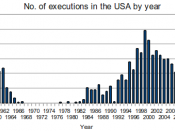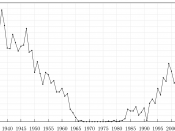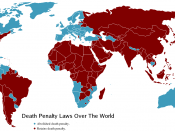One of the most controversial issues that surround the criminal justice system is the death penalty, or capital punishment. In 1972, the U.S. Supreme Court claimed that the death penalty was unconstitutional and was not reinstated until 1976. No one should have the right to end the life of another. Yet, in most cases, it was the wrongdoer(s) who took the life of another person. Many feel that it should be an "eye for an eye" or retribution. People who are pro-capital punishment think that it makes the victims life seem worthless unless the wrongdoer is properly punished. The fact that the death penalty can be both constitutional and unjust is what causes it to be such a profound dilemma in the American psyche.
All cultures view crime and justice in different ways and it is no different when it comes to capital punishment. "Different forms of justice may exist within one sociocultural setting and often in societies with ranked or stratified social structures," (Nader and Sursock).
Capital punishment is retained in 92 countries and territories (1990), including the USA (38 states), China, and Islamic countries. It was abolished in the UK in 1965 for all crimes except treason. Countries that have abolished the death penalty fall into three categories: those that have abolished it for all crimes (44 countries); those that retain it only for exceptional crimes such as war crimes (17 countries); and those that retain the death penalty for ordinary crimes but have not executed anyone since 1980 (25 countries and territories). The first country in Europe to abolish the death penalty was Portugal in 1867.
Early groups had written no laws, but they had norms and customs that regulated behavior. "From earliest times to the present, execution has represented the most extreme reaction to criminal behavior...



Death Penalty
Could be summed up in about 4 1/2 paragraphs...I do like the way in that this pice was written however i find the thesis dull and plain.
All and all...good job!
21 out of 21 people found this comment useful.